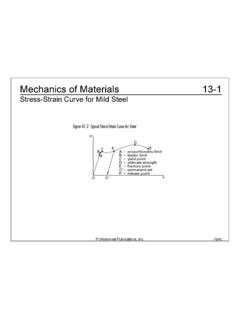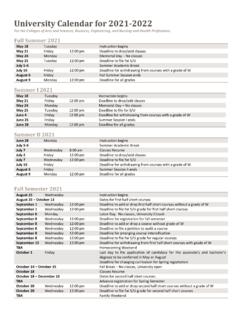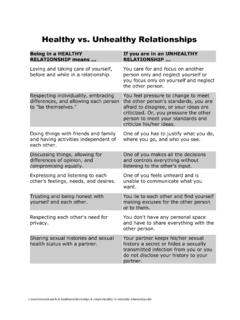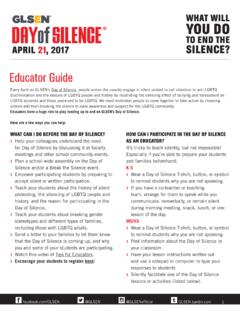Transcription of Facebook off Limits? Protecting Teachers' Private Speech ...
1 Valparaiso University Law ReviewVolume 47 Number 2012 Facebook off limits ? Protecting Teachers' PrivateSpeech on Social Networking SitesLumturije AkitiThis Notes is brought to you for free and open access by the ValparaisoUniversity Law School at ValpoScholar. It has been accepted for inclusionin Valparaiso University Law Review by an authorized administrator ofValpoScholar. For more information, please contact a ValpoScholar staffmember CitationLumturije Akiti, Facebook off limits ? Protecting Teachers' Private Speech on Social Networking Sites, 47 Val. U. L. Rev. 119 (2012).Available at: 119 Notes Facebook OFF limits ? Protecting TEACHERS Private Speech ON SOCIAL NETWORKING SITES I. INTRODUCTION Imagine that every year Lisa, a middle school English teacher in her late twenties, takes a trip to the Bahamas with a group of her closest girlfriends from When she returns from the trip, she posts a photo of herself standing on the beach holding an alcoholic beverage on her Facebook profile.
2 There is nothing revealing or inappropriate about the photo; however, a student s parent gains access to Lisa s Facebook profile and contacts Lisa s principal, voicing her concern regarding Lisa s recent posting. The next day, Lisa is called into the principal s office where the principal asks her a series of questions regarding her Facebook use. Shortly thereafter, Lisa is dismissed from her teaching position at the middle school for immoral misconduct. Now, take another hypothetical. This time, imagine Michelle, a high school teacher in her mid-twenties, who posts a similar photo to the one that Lisa had Michelle is on the beach, in a bathing suit, holding an alcoholic beverage. This time, however, one of Michelle s male students, who is friends with Michelle on Facebook , comments, looking sexy, on the photo.
3 In response, Michelle sends her student a message via Facebook composed of explicit, sexual references. The conversations between Michelle and her student progress to a physical level and ultimately result in a sexual relationship. The student s parents uncover the Facebook messages between Michelle and their son and contact both the principal and the police. Like Lisa, Michelle is dismissed from her high school teaching position. Although these two situations are similar in respect to teachers use of Facebook , the two teachers were dismissed for very different reasons. In the first situation, the teacher was dismissed because a parent gained access to the teacher s profile and saw a seemingly innocent photograph posted to a Facebook wall. However, in the second situation, the teacher was dismissed because of the inappropriate conduct between the teacher 1 This scenario is fictional and solely the work of the author to illustrate the issues presented in this Note.
4 2 This scenario is fictional and solely the work of the author to illustrate the issues presented in this Note. Akiti: Facebook off limits ? Protecting Teachers' Private Speech on SociProduced by The Berkeley Electronic Press, 2012120 VALPARAISO UNIVERSITY LAW REVIEW [Vol. 47 and one of her minor students. Should these two teachers be treated the same based on their use of a popular social media website? Each instance resulted in the dismissal of the individual from her teaching position; however, many would argue that dismissal in the first case was Indeed, some contend that dismissal in the first situation infringes on a teacher s First Amendment free Speech rights, rights that must be Due to the inappropriate conduct of the teacher in the second scenario, it is easy to determine that dismissal from her position was warranted.]
5 These situations briefly highlight the issues that arise when teachers use social networking websites like To date, school boards and administrators have dealt with problems that have surfaced from teachers use of social networking sites. One way that school boards have combatted this problem is by implementing district-level school board policies and acceptable use agreements, which restrict the use of social networking In fact, one state has gone so far as to prohibit parents, who are also teachers, from friending their children, who are students, on In light of such existing measures, teachers have been dismissed, suspended, and even coerced into resignation for what school administrators consider inappropriate use of social networking In response, teachers have threatened and filed claims in district 3 See Constance Lindner, teacher Fired Over Friending, BOS.
6 GLOBE (May 26, 2011), ( An Abington High School substitute teacher and boys tennis coach has been fired following what school officials deemed his inappropriate communication with students on Facebook . ). We have an ethics policy about appropriate boundaries and behavior, and certainly friending students on a social network is not an appropriate boundary to cross, stated the Abington School Superintendent Peter Schafer. Id. See infra note 25 (describing various teacher dismissals resulting from teachers Facebook use). 4 See infra Part (discussing public employees free Speech rights protected under the First Amendment). 5 See infra note 17 (describing the increased use of Facebook by individuals of all walks of life).
7 See generally Emily M. Janoski-Haehlen, The Courts Are All A "Twitter': The Implications of Social Media Use in the Courts, 46 VAL. U. L. REV. 43 (2011) (illustrating the various methods in which social networking sites that have influenced and impacted courtrooms, judges and juries). 6 See infra Part (describing district-level policies and acceptable use agreements restricting teachers social networking use). 7 See infra Part (detailing a Missouri statute that prohibits virtually all teacher -student communication via online social networking sites). 8 See infra Part (providing an overview of current disciplinary actions taken against teachers). See generally Shelbie J. Byers, Note, Untangling the World Wide Weblog: A Proposal for Blogging, Employment-at-Will, and Lifestyle Discrimination Statutes, 42 VAL.
8 U. L. REV. 245 (2007) (discussing disciplinary actions taken against employees for their online blogging). Valparaiso University Law Review, Vol. 47, No. 1 [2012], Art. 4 ] Facebook Off limits ? 121 courts for violations of their First Amendment and due process There is clearly a need to balance the rights of teachers, as Private citizens outside the school setting, and the rights of school administrators looking out for the best interests of This Note seeks to provide the means for teachers to maintain their First Amendment rights despite schools interests in restricting teachers use of online social networking First, Part II of this Note describes the existing conflict between teachers right to communicate via social networking sites and school boards interests in restricting such communication.
9 And explains the analytical framework employed by the courts in addressing teachers First Amendment Second, Part III analyzes the Supreme Court s approach for when a teacher s Speech is entitled to First Amendment protection and also evaluates the adequacy of the Court s approach when applied to cases involving both teachers inappropriate and appropriate Speech via social networking Finally, Part IV proposes a new test, which should be employed by the courts to determine whether, if at all, the Pickering-Connick analysis should be applied to teachers Speech via social networking II. BACKGROUND Social networking websites such as Facebook , Myspace, and Twitter have revolutionized communication on the By making 9 See Snyder v.
10 Millersville Univ., No. 07-1660, 2008 WL 5093140, at *1, *6 ( Pa. Dec. 3, 2008) (claiming First Amendment protection after the teacher was disciplined for her Speech via a social networking site); Spanierman v. Hughes, 576 F. Supp. 2d 292, 299 (D. Conn. 2008) (claiming First Amendment protection after the teacher was disciplined for his Myspace activities). 10 See infra Part (analyzing the rights of teachers and school boards and evaluating the proper balance of such rights). 11 See infra Part IV (arguing that teachers fundamental rights outweigh school boards interest in restricting teacher s Private communications via social networking sites and proposing a new test that courts should use when addressing teachers free Speech claims). 12 See infra Part C (providing an overview of the conflict and competing interests of teachers and school administrators, the current restrictions imposed on teachers social networking use, and the analytical framework used to address teachers First Amendment claims).















